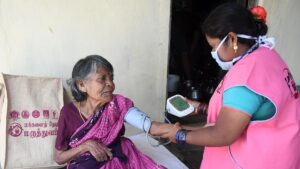GS2 – Polity

Context:
India’s doorstep healthcare schemes underscore the need for active community participation in health governance.
Mechanisms for Civic Participation:
- Civic Engagement: Structured involvement of citizens in health decision-making.
- Community Oversight: Village Health Sanitation and Nutrition Committees (VHSNCs) plan and monitor equitable healthcare access.
- Public Grievances: Jan Sunwai forums address complaints via open hearings.
- Hospital Governance: Rogi Kalyan Samitis, registered societies, manage facility-level resources.
- Urban Engagement: Mahila Arogya Samitis mobilise women in urban slums for health action.
- Social Audits: Community-led audits assess service quality and fund utilisation.
Governance Value of Civic Engagement:
- Transforms health systems from service providers to social contracts.
- Strengthens legitimacy and trust in governance frameworks.
- Ensures accountability by curbing corruption and inequitable resource allocation.
- Enhances equity, prioritising marginalised groups.
- Integrates community inputs into policy, ensuring local health priorities are addressed.
- Encourages knowledge exchange between communities and health experts.
Barriers to Meaningful Engagement:
- Inactive platforms undermine community agency and institutional credibility.
- Mindset barrier: Viewing communities only as service recipients.
- Leadership disconnect: Doctor-led systems may ignore community perspectives.
- Platform inefficiency: Ambiguous committee mandates reduce accountability.
- Fund misallocation: Bureaucratic delays limit community health initiatives.
- Awareness shortfall: Limited knowledge of health rights reduces citizen participation.
Way Forward:
- Empowered citizens and responsive systems are key for participatory health governance.
- Mindset shift: Recognising communities as partners.
- Civic empowerment: Health rights education for informed citizen decision-making.
- Inclusive access: Actively involve marginalised groups.
- Provider training: Sensitise staff to integrate community perspectives.
- Committee empowerment: Clear roles and adequate resources.
Participatory Health Governance Programmes:
- Tamil Nadu: Makkalai Thedi Maruthuvam – Doorstep NCD care with community participation.
- Karnataka: Gruha Arogya – Home-based care mobilising accredited local health workers.
- Kerala: Aardram Mission – Upgraded primary care through participatory family health centres.




